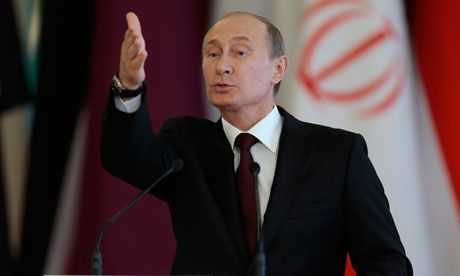
Vladimir Putin has for the first time floated the idea of the US whistleblower Edward Snowden remaining in Russia, hours after the fugitive applied for political asylum in the country.
Snowden applied for asylum at the consular office at Moscow's Sheremtyevo airport at 10.30pm on Sunday through his WikiLeaks handler, Sarah Harrison, a consular official said.
A statement on the WikiLeaks website later said Snowden had applied for asylum in a further 20 countries, including France, Germany, Ireland, China and Cuba.
"The UK citizen Sarah Harrison passed on a request by Edward Snowden to be granted political asylum," said Kim Shevchenko, a staff member at the airport's consular department. He said he then called the Russian foreign ministry, who sent a courier one hour later to pick up the request.
He declined to say where Harrison or Snowden, who have not been seen since landing in Sheremtyevo last week, were staying. "She didn't say and I didn't ask," he said.
In a move likely to enrage the US, Putin said on Monday: "If he wants to go somewhere and someone will take him, go ahead. If he wants to stay here, there is one condition – he must stop his work aimed at bringing harm to our American partners, as strange as that sounds coming from my mouth."
Snowden has been trapped in Moscow's Sheremetyevo airport since 23 June after flying in from Hong Kong, from where he leaked top secret documents detailing NSA surveillance programmes.
Stripped of his US passport, he has been stuck in limbo since. His attempts to gain political asylum in Ecuador, whose London embassy is currently sheltering the WikiLeaks founder Julian Assange, appear to have dried up amid intense US lobbying and reported disagreements within the Ecuadorian government.
Snowden met Russian diplomats on Monday morning and handed them a list of 15 countries where he would like to apply for political asylum, the Los Angeles Times reported, citing an unnamed source in the foreign ministry.
Putin appeared to leave himself some latitude, noting that Snowden would be unlikely to meet his conditions for staying in Russia.
"Considering that he considers himself a human rights activist and a fighter for human rights, he probably doesn't plan to stop this work, so he should choose a host country and head there," Putin said. "When this will happen I, unfortunately, do not know."
Putin, speaking at a press conference after a meeting of gas exporting countries, reiterated that Russia would not extradite Snowden to the US. "Russia never gives anyone up and doesn't plan to give anyone up. And no one has ever given us anyone."
For the second time Putin, unprompted, insisted that Snowden was not working with Russia's secret services. "Mr Snowden is not our agent, never was and isn't today. Our special services have never worked with him and are not working with him."
Russia maintains one of the world's most developed intelligence mechanisms and is widely believed to engage in snooping on its own citizens. In stark contrast to Russia's approach to Snowden, whom Putin likened to the Soviet-era dissident Andrei Sakharov, Russian whistleblowers are often attacked – one, the anti-corruption activist Alexey Navalny, is currently on trial and another, the lawyer Sergei Magnitsky, died in prison.
And yet Assange remains a champion of the Kremlin. Earlier this month, the WikiLeaks founder, who had a television show on the Kremlin's English-language propaganda channel Russia Today, said he had advised Snowden to seek asylum there.
Nicolás Maduro, the Venezuelan president, is currently in Moscow for the two-day gas conference and it was believed he and Putin would discuss Snowden's fate. Putin's foreign policy adviser, Yury Ushakov, said the pair had not discussed Snowden yet.
A campaign calling for Snowden to stay in Russia has gathered momentum since he first arrived in Moscow last week. On Monday , several MPs and influential Russians floated the idea during a meeting of the Public Chamber, a body that advises the Kremlin.
"It's not right that Snowden is sitting in this terminal like in a prison," said Sergei Markov, a former MP who maintains close ties to the Kremlin. "Unlike prison, he can't even go out and breathe fresh air. On humanitarian grounds, I think he should be presented with a way to enter Russian territory."
Several MPs said they would nominate Snowden for a Nobel peace prize. The overtures to Snowden, charged under espionage laws in the US, come as US-Russia relations plummet to cold war lows.
Just before Putin made his comments, one of his top aides said that US-Russia attempts to find possible solutions to the conflict around Snowden were rather difficult.
"Of course [Putin and Obama] don't have a decision that would suit both sides, so they have ordered FSB director [Alexander] Bortnikov and FBI director [Robert] Mueller to be in constant contact and find possible solutions," Nikolai Patrushev, head of Russia's security council and a former head of the FSB, told state-run Vesti television.
"We must also stress that the task they have is rather difficult, because they must find a solution within the framework of international law. We can't directly say today that such norms exist, or that there's a ready recipe," he said.
Since Putin first acknowledged Snowden's arrival in Moscow, officials have repeatedly noted the absence of a bilateral extradition treaty. Russia has often expressed concern over its citizens held in the US, namely Viktor Bout, a convicted arms trafficker with suspected ties to Kremlin officials.
 В Атырау -10
В Атырау -10